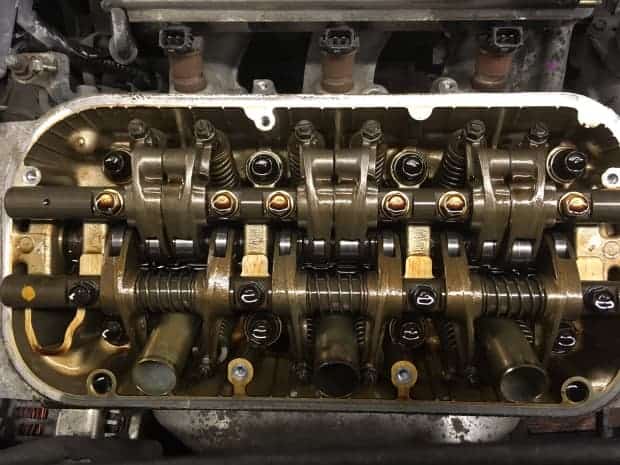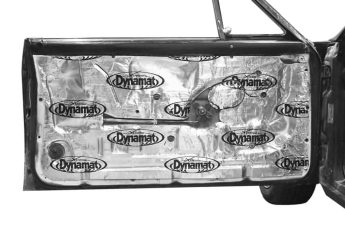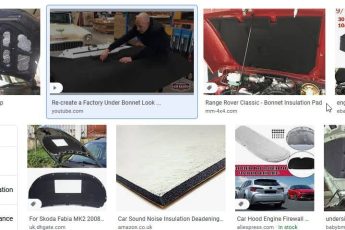There are several possible causes of engine ticking noises. They include Reciprocating components, Low oil, and worn spark plugs. In some instances, the noise may be coming from the exhaust manifold. If this is the case, you should take your vehicle to a mechanic to diagnose the problem.
Reciprocating components
The ticking noise in an engine usually comes from the reciprocating components of the engine, such as the valves, pistons and pushrods. When these components become worn or damaged, they will begin to slip and create a ticking noise. This noise may also be accompanied by whining or clunking sounds.
If you’ve noticed this noise while driving, take a look at what’s causing it. The most common source is a bad piston. Pistons are the reciprocating parts that move, so they are the most likely to cause the ticking noise. To fix the problem, check the piston and the connecting rod bearing to see if there’s any wear or damage.
Another possible source of engine ticking noises is faulty spark plugs. If your spark plugs are cracked, remove them and replace them with new ones. Make sure the new ones are compatible with your engine. Other potential causes of engine ticking noises include worn-out reciprocating components. In most cases, the best solution is to replace these components with new ones. Temporary solutions won’t work because the underlying problems have to be addressed.
Low oil
If you’re having problems with your vehicle’s engine, you may have a low oil level. This is the cause of engine ticking noises and can lead to severe engine damage. While some engine ticking is normal, it can be very distracting and even dangerous if you’re driving. Fortunately, there’s a simple solution for this problem.
You can check your oil levels by visiting your local auto repair shop. This simple test will determine whether your engine is running low on oil or has another problem. Engine ticking noises can also occur because of a failed gasket or cracked exhaust manifold. If you can’t determine the exact cause, a DIY tune-up can help.
Another possible cause of engine ticking noises is misaligned valves. When the valves are misaligned, air gets into the combustion chamber and causes engine ticking noises. To prevent this problem, use high-mileage oil. If the problem persists, visit your local United Tire and take your vehicle for an oil change.

When oil pressure drops below a certain level, the engine may overheat. This is because the oil can no longer cool the engine properly. A low oil level also prevents the coolant from being able to cool the engine. This causes the engine to heat up and eat up the coolant.
Old spark plugs
Your engine may be emitting an irritating noise because of old spark plugs. A good spark plug is a crucial component of a car’s engine because it seals the combustion cylinders and prevents gas from escaping during engine operation. Incompatible spark plugs can strip the cylinder head’s threads and cause low cylinder compression, which leads to an engine ticking noise.
The tapping noise in an engine can also be caused by a lack of oil lubrication, misaligned spark plugs, and valve train components. This noise is often accompanied by a jittery idle and difficulty starting the vehicle. If these symptoms are present, it is time to get your car checked.
An old spark plug can cause an engine ticking noise, which can be dangerous. It can destroy the engine by causing multiple micro-explosions in the combustion chamber. These explosions can cause the cylinder block to fail. If you notice this sound coming from your engine, you should replace the spark plugs as soon as possible. Another potential cause is worn-out reciprocating parts in the engine. The best way to fix this problem is to replace all worn-out components. Temporary fixes can only mask the problem for a while.
An engine ticking noise may also be caused by engine oil. The oil lubricates the various parts inside the engine. A problem with the oil can also affect the engine’s accessories. If you’re looking for a way to fix an engine ticking noise, make sure to check your vehicle’s manual first. It will help you determine which spark plugs you need to replace.
Exhaust manifold leak
A ticking noise coming from your car’s exhaust is often a sign of an exhaust manifold leak. The leak occurs when exhaust gases leak under high pressure and is caused by a leaking gasket or rupture in the manifold. This is a common problem and can be easily fixed. However, excessive exhaust gas leakage may damage the engine and should be repaired as soon as possible.
A leaking exhaust manifold will affect the engine’s gas mileage, resulting in poor performance. The engine’s computer will be forced to adjust air settings in order to compensate for the gas mileage loss caused by the leak. This may result in decreased fuel efficiency and increased fuel costs. Fortunately, more people are beginning to recognize these symptoms and take action to repair them. Experts at Midland Muffler are here to help you determine if your car’s exhaust manifold needs repair.
To begin the repair process, remove the exhaust manifold and inspect the mounting/mating area. Ensure that the area is smooth and free of corrosion. A white or black coloring around the mounting/mating surface will be an indicator of a leak. A loosening of hardware at this area may also cause an exhaust leak.

Worn tolerances in the valvetrain
A ticking noise on an engine is a sign that something isn’t right with the valvetrain. A common cause is worn-out tolerances in the valves. The best solution is to rebuild the entire engine, which is not a cheap process. However, if your ticking noise is a bit more severe, there are other things you can try to fix it.
While this noise may be the result of worn valve stem seals, it is not always a direct result of worn valves. It can be caused by worn tolerances in other parts of the valve train, including the cylinder head. If the valve stem seals are worn, you can replace them without removing the cylinder head. Or, you can try filling the combustion chamber with compressed air to help the engine run smoother.
A low oil level can also cause engine ticking noise. The valves are highly sensitive to oil pressure, and inadequate oil pressure will wear down the top end of the engine. If you notice that your engine is making this noise, you need to check your oil and seek assistance from a mechanic.
Pinging sound
Pinging sound is common in engines and can be caused by many things. The most common cause of the sound is normal wear of the engine. Sometimes the ticking noise is the result of fuel injectors operating improperly. These small valves allow the engine to receive fuel and air from the fuel tank. In some cars, the ticking noise is so loud that it can be unnerving. If you hear a ticking noise when the engine is running, check the oil dipstick.
Another possible cause of engine ticking is a bad bearing in the connecting rod. If this is the case, the connecting rod will begin to move and cause the engine ticking sound. This sound will vary in frequency with engine RPM and does not change with temperature or load. The only cure for this problem is to rebuild the motor.
If the noise persists, there may be an oil issue. This will affect a number of parts, including the valves. If you are unsure of where the noise is coming from, visit a mechanic for assistance. The repair job may involve replacing the shims or adjusting the rocker. Another more serious issue that causes engine ticking is rod knock. This is when the bearing that connects the rod wears off and makes the engine tick.
Repair options
If you hear an engine ticking noise, there are a number of repair options available. One of the most expensive options is to completely rebuild the motor. Although it is not cheap, this option is often the best option for engine ticking noises. Another option is to clean the oil. Dirty oil impedes the natural functioning of an engine, making it noisy.
A problem with the lifter or the rocker arm can cause an engine to tick. A qualified technician can replace these components, but it is a labor-intensive process. In some cases, an experienced car owner can perform this repair on his or her own. However, it is still best to visit a mechanic if you’re unsure of what you’re doing.

If you hear an engine ticking noise, you need to take it seriously. While it is perfectly normal for an engine to make a ticking noise, excessive ticking can be an issue. It’s best to get a mechanic’s help as soon as possible.





